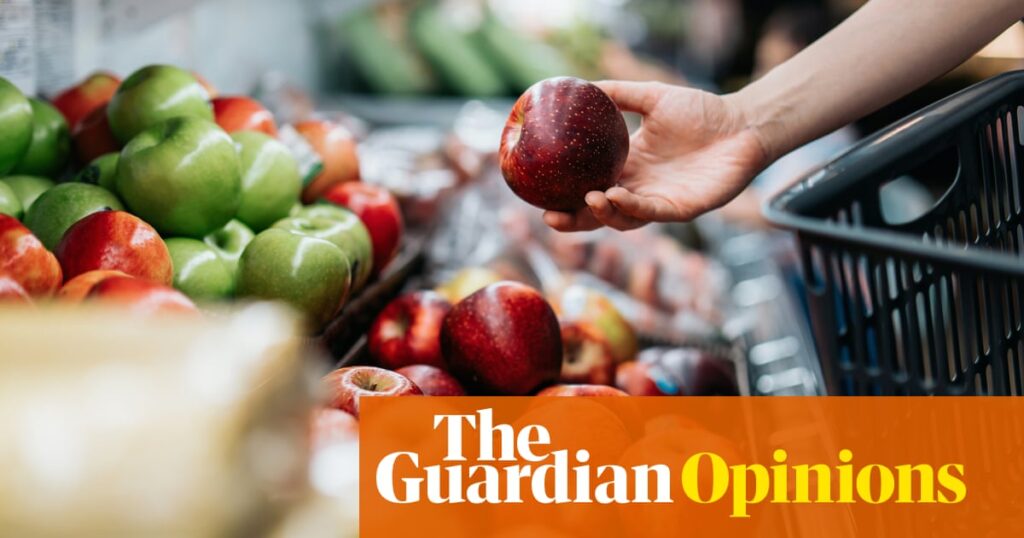The government’s policy on obesity, announced on Sunday, sounds as though it’s tough on the supermarkets: they really must do better on the health front, ministers say. Put the fruit nearer the doors (where it is already), make sure loyalty cards reward good choices. Calorie for calorie, a basket of healthy food costs more than twice as much as a basket of less healthy food, according to a report by the Food Foundation.
That statistic sounds stark until you engage your brain. Processed food is cheap because that is the “process”: the relentless prioritising of the profit margin over every other consideration, such as nutritional value. What else are you going to use all that big, capitalist brain power for? Making food more colourful?
There are other suggestions: voucher rewards for people who live more healthily; doubling the number of spaces on the NHS digital weight-management programme. There are cute little facts, too: cutting 50 calories a day would reduce the obesity numbers by 2 million adults and 340,000 children; a reduction of a single sugary fizzy drink a day would halve obesity.
The missing plank in this raft of suggestions is the only one that would make any difference: addressing the price of food. There is a reason that one in three children in deprived areas are overweight, compared with one in five in the general population – people on low incomes cannot afford healthy food. Prices have to come down or incomes have to go up. It’s amazing how many words a government paper can put into not saying that.
Any kind of government intervention on pricing sounds pretty radical, right? The kind of thing a Marxist might suggest; the slippery slope to a collectivist five-year plan. In fact, in August 2023, at the height of the inflation crisis triggered by Russia’s invasion of Ukraine, France capped the price of 5,000 grocery products, with the finance minister criticising big food by name – Unilever, Nestlé and PepsiCo – for failing to lower prices sufficiently.
But the French have form on revolutions and whatnot. Hungary’s nationalist strongman Viktor Orbán? Not so much. Yet even he imposed mandatory price cuts on some basic food items in June 2023.
Kamala Harris initially fought her election on three “opportunity economy” measures: tackling the cost of groceries, housing and medical care. She sounded much more corporate-curious by the end of that campaign than she had at the start and the jury is still out on whether that was a good idea (not).
If we imagine, though, that no UK politician could ever take a stand as dangerously disruptive as the communist firebrands Macron, Orbán and Harris, there is one other tiny thing we could try: raising incomes. You could call this the elephant in the room, but you know the other thing they say about elephants: how do you eat one, except one bite at a time? Ahead of a coherent plan to raise incomes, the government could start by not restricting disability benefits. Even though those people exist in different headlines, they are part of the same reality – when you don’t have enough money, you can’t afford healthy food.
In a report published in November, The False Economy of Big Food, the economist Tim Jackson identified the mechanisms by which deprivation causes chronic illness in a more granular and sophisticated way. Food processing isn’t just blase about sugar, salt and saturated fat; it strips out nutrients and fibre in the quest for shelf life and profitability.
It’s uncontroversial to say that processed food is cheap and that it makes us ill, but the logical conclusion – that we are being poisoned by an industry against which only surplus wealth can protect us – is peculiarly unsayable. Never accuse them of that: you will sound like a nitwit. Instead, we get a flurry of suggestions, pitched between rearranging the fridge displays on the Titanic and imploring individuals to just do better.


